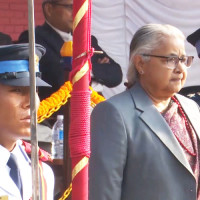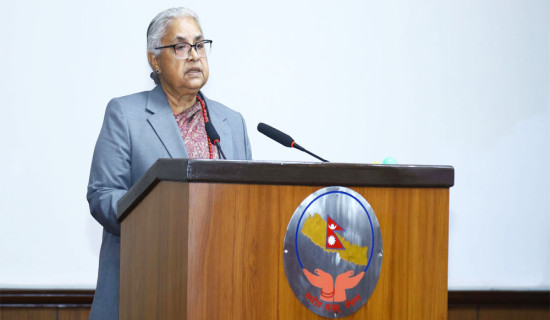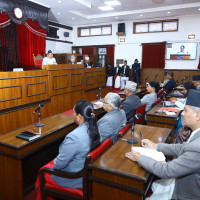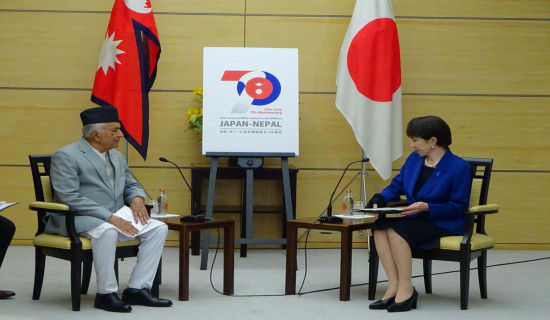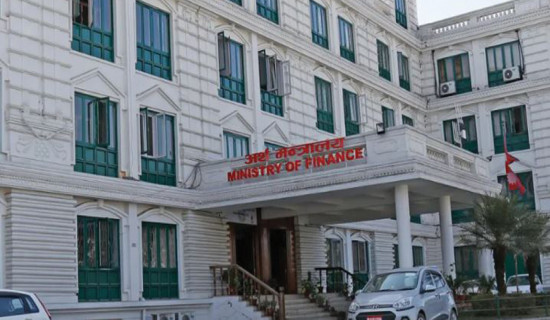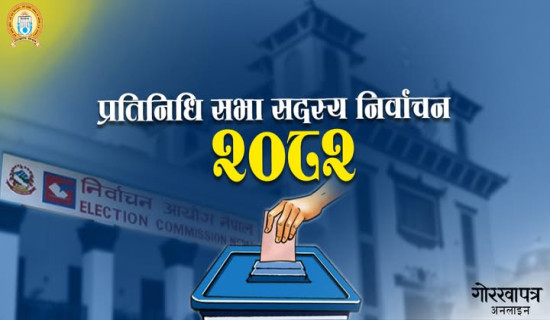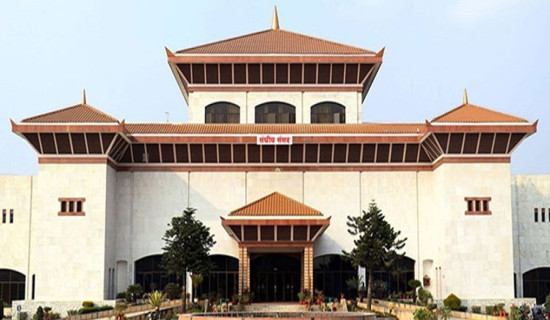- Tuesday, 3 February 2026
Sagarmatha Sambaad being organized to advocate for climate justice
By Bhishma Raj Ojha, Kathmandu, Jan 20: Nepal has been according high priority to the climate change issue which has emerged as the topic of global concern over the recent years.
Nepal's participation has also been increasing in the national and international programmes and forums related to this issue.
In this context, Nepal has resumed preparations to organize 'Sagarmatha Sambaad (Dialogue)' after a long wait. Earlier in 2076 BS, preparations for the Sagarmatha Dialogue initiated by the then Prime Minister KP Sharma Oli-led government had to be postponed at the last moment due to COVID-19.
The government has advanced the Sagarmatha Dialogue to gain global leadership on climate change and advocate for climate justice.
The ministry of Foreign Affairs and the Ministry of Forests and Environment have initiated preparations for the event by forming various committees.
The Council of Ministers has made a decision to organize the Sagarmatha Sambaad every two years. In 2025, it is proposed to be convened on May 15, 16 and 17.
Heads of state and government of mountainous and maritime countries, experts working in the field of climate research, representatives of the private sector of national and international level, subject experts, media experts and social influencers will be especially invited to the dialogue.
Dialogue to be made part of International Year of Glaciers' Preservation
Joint-secretary and chief of the Climate Change Management Division at the Ministry of Forests, Dr Maheshwor Dhakal, said that Nepal is going to start the preparations for the Dialogue by declaring it as part of the International Year of Glacier Conservation tomorrow.
The United Nations is celebrating 2025 as the International Year of Glaciers' Preservation. The World Meteorological Organization (WMO) and UNESCO, representing the United Nations, are jointly launching the International Year of Glaciers' Preservation on January 21.
On this occasion, Prime Minister Oli will announce the Sagarmatha Sambaad in Nepal tomorrow or on January 21.
All ministers, secretaries, heads of diplomatic missions, chiefs of development partner organisations, heads and representatives of organisations working in the climate sector, media and others will participate in the announcement programme to be held at the Office of the Prime Minister and Council of Ministers.
The Sagarmatha Sambaad is going to be held for the first time in the country, under the theme of 'Climate Change, Mountain and Human Future'. Since COVID-19, four international conferences have been held in the field of climate change, namely COP-26 in Glasgow, COP-27 in Sharm El-Sheikh, COP-28 in Dubai and COP-29 in Baku. He said that since the climate agenda has become more pronounced, it is inevitable for Nepal to organize the Dialogue.
Joint Secretary Dr Dhakal, who is coordinating for the Dialogue, said, "Looking at the effects of climate change on the mountainous region and the problems faced by the local people, there is a need for more discussion and debate in this area. On the basis of this, the need to find solutions for collective efforts to develop the ability to deal with the effects of climate is being raised everywhere. Nepal has announced that it will reduce carbon emissions to zero by 2045.
Nepal's policies on climate are good, but the resources available for implementation are low and the capacity is weak economically and socially. "In spite of that, Nepal is providing services to the international community by protecting biological diversity and environment," he said, adding, "but instead of paying for these services, the international community has contributed to the melting of snow and glaciers on our mountains by emitting carbon."
According to him, during the dialogue, climate justice will be advocated for and if we fail to explain to the international community in time and find solutions, we may have to pay a huge price to save our human civilization.
"Informing the international community about the impact of climate change on Nepal, thereby increasing capacity building for access to climate finance, increasing youth participation in technology development and expansion, providing more resources to local communities for adaptation are the objective of the Dialogue."
Informing the world community about the pain of being exposed to high risk even with low carbon emissions, Nepal will also advocate during the Dialogue regarding the compensation that Nepal should receive from the damage it is suffering from climate change consequences and the payment for the environmental services provided by Nepal.
"Climate change is a serious global challenge to all. Its effect is more visible especially in countries like Nepal with a small crop and sensitive geography."
In this year alone, Nepal had to suffer a huge loss of life and property due to climatic disasters. It is estimated that climate-related risks and disasters will increase in the future. According to scientific studies, it is estimated that the temperature of the Himalayan region will be 0.3°C to 0.7°C higher than the average temperature of the world in the present and future. (RSS)




